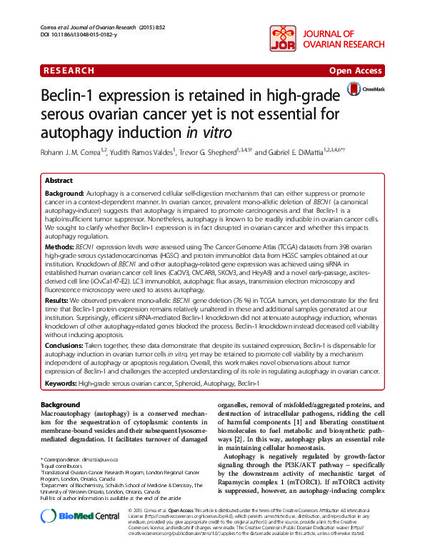
BACKGROUND: Autophagy is a conserved cellular self-digestion mechanism that can either suppress or promote cancer in a context-dependent manner. In ovarian cancer, prevalent mono-allelic deletion of BECN1 (a canonical autophagy-inducer) suggests that autophagy is impaired to promote carcinogenesis and that Beclin-1 is a haploinsufficient tumor suppressor. Nonetheless, autophagy is known to be readily inducible in ovarian cancer cells. We sought to clarify whether Beclin-1 expression is in fact disrupted in ovarian cancer and whether this impacts autophagy regulation.
METHODS: BECN1 expression levels were assessed using The Cancer Genome Atlas (TCGA) datasets from 398 ovarian high-grade serous cystadenocarcinomas (HGSC) and protein immunoblot data from HGSC samples obtained at our institution. Knockdown of BECN1 and other autophagy-related gene expression was achieved using siRNA in established human ovarian cancer cell lines (CaOV3, OVCAR8, SKOV3, and HeyA8) and a novel early-passage, ascites-derived cell line (iOvCa147-E2). LC3 immunoblot, autophagic flux assays, transmission electron microscopy and fluorescence microscopy were used to assess autophagy.
RESULTS: We observed prevalent mono-allelic BECN1 gene deletion (76 %) in TCGA tumors, yet demonstrate for the first time that Beclin-1 protein expression remains relatively unaltered in these and additional samples generated at our institution. Surprisingly, efficient siRNA-mediated Beclin-1 knockdown did not attenuate autophagy induction, whereas knockdown of other autophagy-related genes blocked the process. Beclin-1 knockdown instead decreased cell viability without inducing apoptosis.
CONCLUSIONS: Taken together, these data demonstrate that despite its sustained expression, Beclin-1 is dispensable for autophagy induction in ovarian tumor cells in vitro, yet may be retained to promote cell viability by a mechanism independent of autophagy or apoptosis regulation. Overall, this work makes novel observations about tumor expression of Beclin-1 and challenges the accepted understanding of its role in regulating autophagy in ovarian cancer.
Available at: http://works.bepress.com/gabriel-dimattia/2/
